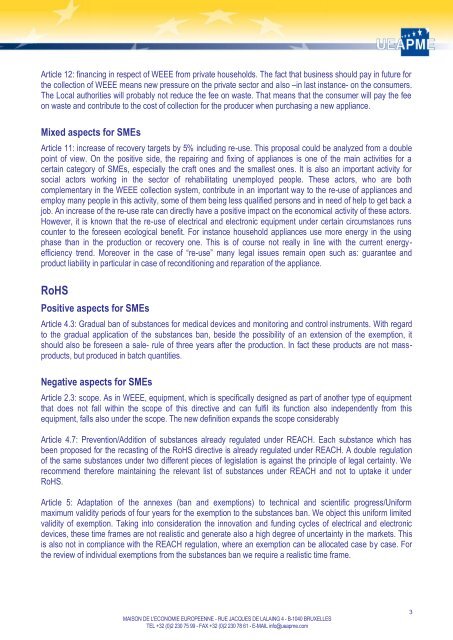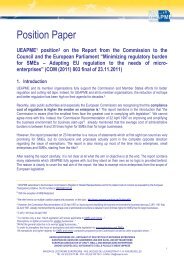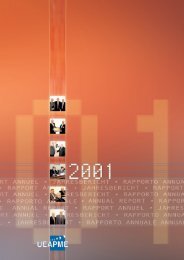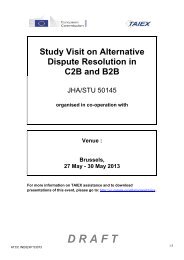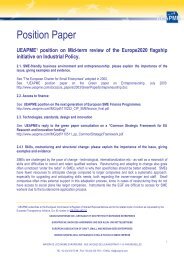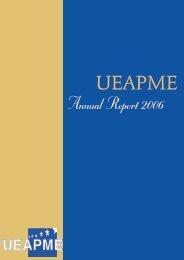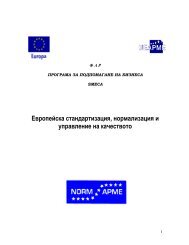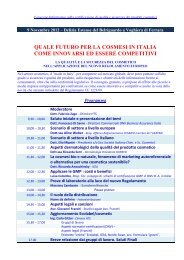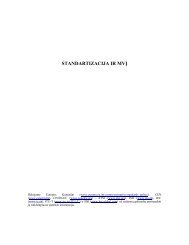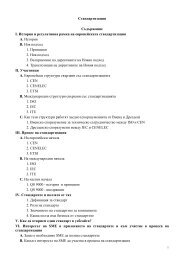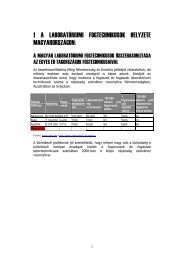Position Paper - UEAPME
Position Paper - UEAPME
Position Paper - UEAPME
You also want an ePaper? Increase the reach of your titles
YUMPU automatically turns print PDFs into web optimized ePapers that Google loves.
Article 12: financing in respect of WEEE from private households. The fact that business should pay in future for<br />
the collection of WEEE means new pressure on the private sector and also –in last instance- on the consumers.<br />
The Local authorities will probably not reduce the fee on waste. That means that the consumer will pay the fee<br />
on waste and contribute to the cost of collection for the producer when purchasing a new appliance.<br />
Mixed aspects for SMEs<br />
Article 11: increase of recovery targets by 5% including re-use. This proposal could be analyzed from a double<br />
point of view. On the positive side, the repairing and fixing of appliances is one of the main activities for a<br />
certain category of SMEs, especially the craft ones and the smallest ones. It is also an important activity for<br />
social actors working in the sector of rehabilitating unemployed people. These actors, who are both<br />
complementary in the WEEE collection system, contribute in an important way to the re-use of appliances and<br />
employ many people in this activity, some of them being less qualified persons and in need of help to get back a<br />
job. An increase of the re-use rate can directly have a positive impact on the economical activity of these actors.<br />
However, it is known that the re-use of electrical and electronic equipment under certain circumstances runs<br />
counter to the foreseen ecological benefit. For instance household appliances use more energy in the using<br />
phase than in the production or recovery one. This is of course not really in line with the current energyefficiency<br />
trend. Moreover in the case of “re-use” many legal issues remain open such as: guarantee and<br />
product liability in particular in case of reconditioning and reparation of the appliance.<br />
RoHS<br />
Positive aspects for SMEs<br />
Article 4.3: Gradual ban of substances for medical devices and monitoring and control instruments. With regard<br />
to the gradual application of the substances ban, beside the possibility of an extension of the exemption, it<br />
should also be foreseen a sale- rule of three years after the production. In fact these products are not massproducts,<br />
but produced in batch quantities.<br />
Negative aspects for SMEs<br />
Article 2.3: scope. As in WEEE, equipment, which is specifically designed as part of another type of equipment<br />
that does not fall within the scope of this directive and can fulfil its function also independently from this<br />
equipment, falls also under the scope. The new definition expands the scope considerably<br />
Article 4.7: Prevention/Addition of substances already regulated under REACH. Each substance which has<br />
been proposed for the recasting of the RoHS directive is already regulated under REACH. A double regulation<br />
of the same substances under two different pieces of legislation is against the principle of legal certainty. We<br />
recommend therefore maintaining the relevant list of substances under REACH and not to uptake it under<br />
RoHS.<br />
Article 5: Adaptation of the annexes (ban and exemptions) to technical and scientific progress/Uniform<br />
maximum validity periods of four years for the exemption to the substances ban. We object this uniform limited<br />
validity of exemption. Taking into consideration the innovation and funding cycles of electrical and electronic<br />
devices, these time frames are not realistic and generate also a high degree of uncertainty in the markets. This<br />
is also not in compliance with the REACH regulation, where an exemption can be allocated case by case. For<br />
the review of individual exemptions from the substances ban we require a realistic time frame.<br />
MAISON DE L'ECONOMIE EUROPEENNE - RUE JACQUES DE LALAING 4 - B-1040 BRUXELLES<br />
TEL +32 (0)2 230 75 99 - FAX +32 (0)2 230 78 61 - E-MAIL info@ueapme.com<br />
3


